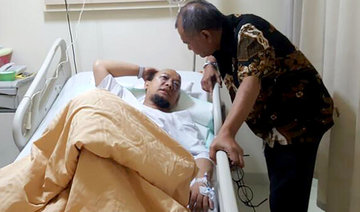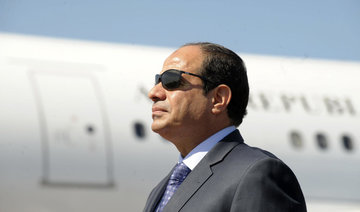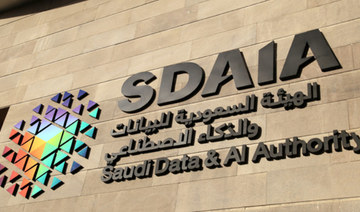BRASILIA: The politicians caught up in Brazil’s biggest ever corruption scandal are well known to the public. But their alter egos, like “Viagra” and “BMW,” less so.
Odebrecht, the massive engineering company that admits to systematic bribery of politicians, has revealed that code names were given to its long list of alleged bribe-takers.
The graft was so widespread that Odebrecht set up a whole department to handle payments. However, given the illegal nature of the business, they referred to politicians with an imaginative series of handles, published in full on Monday by G1 news site.
Some congressmen were given wholesome sounding labels, like “Cowboy” and “Fisherman.” Others got more fanciful treatment: “Princess” for a deputy state governor called Cida Borghetti or “Muse” for the state lawmaker Ana Paula Lima.
“BMW” was the name given to congressman Beto Mansur, while “Viagra” was another deputy, Jarbas Vasconcelos.
Some nicknames invented by Odebrecht indicated little love lost, apart from the love of illicit money making, of course.
Senator Jader Barbalho became “Crocodile,” congressman Paes Landim was “Decrepit,” Senator Humberto Costa was “Dracula” and another senator, Edison Lobao, was memorialized as “Squalid.”
As for Rio de Janeiro’s ex-mayor, who is accused of taking millions of dollars in bribes during preparations for last year’s Olympics, he was filed under “The little nervous one.”
To organize its files on the political parties taking bribes, Odebrecht swapped party names for famous football clubs. The leftist Workers’ Party became Flamengo and today’s main ruling center-right coalition partners PMDB and PSDB became Internacional and Corinthians.
’Viagra’ and other code names in Brazil’s corruption scandal
’Viagra’ and other code names in Brazil’s corruption scandal

Goldman Sachs to establish regional headquarters in Riyadh: report

RIYADH: Goldman Sachs Group is set to become the first Wall Street bank to establish its regional headquarters in Saudi Arabia as it has reportedly obtained a license from the Ministry of Investment, reported Bloomberg.
As per the recently approved laws in Saudi Arabia, companies with state contracts must have a regional headquarters in the Kingdom with a minimum of 15 employees.
Arab News contacted the Investment Ministry to get a confirmation of the news but officials declined to comment.
It would be pertinent to mention here that Goldman Sachs currently has offices in Doha, Riyadh and Dubai.
Saudi Arabia has outperformed its target for attracting regional headquarters, with over 180 companies now established in the Kingdom. This number surpassed the initial goal of securing 160 HQs by the end 2023.
Saudi Arabia offers tax incentives for foreign companies that locate their regional headquarters in the Kingdom, including a 30-year exemption for corporate income tax.
The tax incentives include zero income tax for foreign entities that move their regional headquarters in the Kingdom, and these benefits can be availed from the date of the regional headquarters issuance license, according to Ministry of Investment.
Saudi Arabia issues 54 industrial licenses in March

RIYADH: Saudi Arabia maintained the issuance of over 300 industrial licenses in the first quarter of 2024, consistent with the previous year, official data has revealed.
According to a statement released from the Kingdom’s Ministry of Industry and Mineral Resources, as many as 324 industrial permits were issued in the first three months of the year, with 54 approvals issued in March alone.
The report further showed that the volume of investments in March amounted to SR1.047 billion ($279 million).
This falls in line with the Saudi Arabia’s ambition to transform mining into a foundational industrial pillar of the country’s economy.
It also aligns with the ministry’s goal to strengthen the sector as well as contribute to the ongoing developments in accordance with Vision 2030.
Moreover, the report, which was issued by the ministry’s National Industrial and Mining Information Center, disclosed that the permits in March were distributed across several sectors, including the manufacturing of non-metallic mineral and food products and formed metal goods as well as chemicals and paper and its products.
According to the analysis, the new industrial licenses were distributed among multiple regions, including the Eastern Province, Riyadh and Makkah, as well as Qassim, Jazan, Madinah, Al-Jouf, and Al-Baha.
The distribution of new permits shows that small enterprises comprised 77.78 percent, with medium-sized companies following at 22.22 percent.
In terms of the type of investments, national factories accounted for the largest percentage of the total licenses, with 98.15 percent, followed by foreign establishments with 1.85 percent.
Furthermore, the study also indicated that the number of factories existing and under construction in the Kingdom until the end of the same month reached 11,832 factories, up from 11,757 facilities in February, with an investment volume of SR1.528 trillion.
Meanwhile, 69 factories started production in March, with an investment volume of SR1.339 billion.
The ministry issues its report monthly to establish the sector’s most critical indicators in Saudi Arabia, demonstrating the extent of change and the growth of industrial investments.
In April, the Kingdom introduced the Mining Exploration Enablement Program, inviting global firms and explorers to participate in the initiative in an attempt to further expand the sector.
According to a statement at the time, Saudi Arabia’s Ministry of Industry and Mineral Resources and the Ministry of Investment extended invitations to international companies in the sector to register for the scheme.
The statement further added at the time that the program is expected to boost exploration activities, optimize the value extracted from the mining sector, and expand the Kingdom’s survey potential by focusing on uncharted territories.
Saudi Arabia to reshape global tourism landscape, says Al-Khateeb
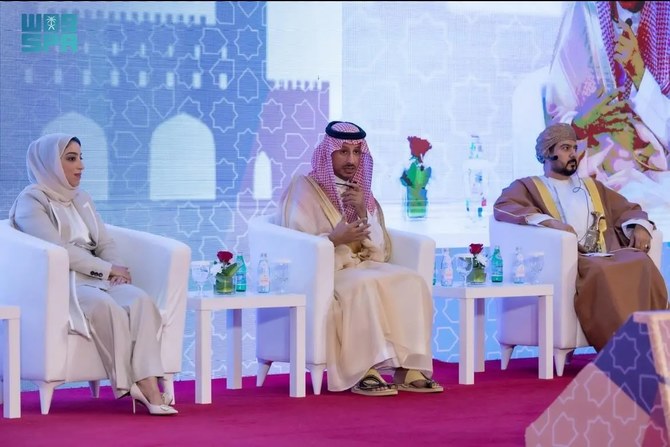
RIYADH: Saudi Arabia is on track to change the map of tourism on a global level, according to a top minister.
Participating in a dialogue session on the sidelines of the 50th UN Tourism Regional Commission for the Middle East taking place from May 22 to 24 in Muscat, Saudi Tourism Minister Ahmed Al-Khateeb stressed that the Kingdom is working in cooperation with regional member states of the organization to further develop the industry, according to the Saudi Press Agency.
This is in line with Saudi Arabia’s National Tourism Strategy, which aims to reach 150 million visitors by 2030, grow the private sector’s contribution, and attract direct foreign investments, adding to the economic growth and diversification.
“The Kingdom will change the map of tourism in the world, and the opportunities and facilities that we provide to investors will make the tourism sector more attractive, and we are proceeding in a distinctive way in building the sector,” Al-Khateeb affirmed.
During the session, the minister also indicated that Saudi Arabia has begun to develop the tourism division as part of its Vision 2030 plan, noting that the development efforts have succeeded in raising the sector’s contribution from 3 percent of the local economy to 4.5 percent by the end of the last year.
Al-Khateeb also drew attention to the fact that the Middle East has great potential and natural resources that enable it to become one of the most important tourist destinations in the world.
He explained that the countries in the region are moving as a single bloc in the right direction regarding developing the tourism sector, as they have begun designing plans and strategies to benefit from this promising industry.
The minister highlighted that attracting and qualifying the national human resources are two important factors for developing the regional sector, stressing that the Saudi Ministry of Tourism pays great attention to the issue of qualifying national cadres working in the field.
The body also works to attract young men and women in the Kingdom to work in the industry.
In April, the deputy minister of destination enablement at the Ministry of Tourism said that Saudi Arabia is open to readjusting its goal of attracting 150 million visitors by 2030 if those numbers are achieved ahead of time.
Speaking in an interview with Arab News on the sidelines of the first day of the Future Hospitality Summit in Riyadh, Mahmoud Abdulhadi explained that goals are adjusted based on performance.
“As we hit our target seven years ahead of target, our 100 million target, we therefore now have a new goal. I’m sure if we were to hit that new target with a significant overperformance in terms of the timeline, our targets would also be adjusted,” Abdulhadi said.
Brazil scheduled to host FII Priority Summit in June

RIYADH: The Future Investment Initiative Institute has expanded its reach by unveiling its inaugural Latin American FII Priority Summit scheduled to take place in Brazil.
The event under the theme “Invest in Dignity” will take place from June 11 to 13 at the Copacabana Palace in Rio de Janeiro, the Saudi Press Agency reported.
The Rio summit will explore how investing in renewable energy, artificial intelligence, entrepreneurship, and social impact can put people, respect, and dignity at the heart of policymaking.
Moreover, discussions will touch on ensuring that all citizens’ dignity is protected and prioritized, suggesting that this should be a goal for all economic decision-makers.
As per SPA, FII Institute chief executive and board member Richard Attias said the focus will be on responsible investment and economic growth decision-making.
“This summit marks a pivotal moment in shaping a sustainable and technologically advanced future for all,” said Attias.
The FII Priority program is an annual series of summits, reports, and initiatives designed to tackle the world’s biggest challenges and concerns.
On the other hand, Saudi Arabia reaffirms its role as a global hub for discussions on a prosperous future as the FII Institute unveiled the theme “Infinite Horizons: Investing Today, Shaping Tomorrow” for its eighth annual FII conference, scheduled to take place from Oct. 29 to 31 at Riyadh’s King Abdulaziz International Conference Centre.
With this theme, the event will ignite talks on how investment can serve as a catalyst for a prosperous and sustainable future, pushing the boundaries of what is possible for humanity.
The discussions at the conference will be data-driven, ensuring that insights are based on facts and actionable strategies, SPA reported.
Attias emphasized the significance of the theme, highlighting that it is a loud call “to expand our collective vision and embrace the limitless prospects of the future.”
He added: “It embodies our commitment to driving conversations that lead to a future where investment knows no bounds and works towards a better tomorrow for all.”
FII8, organized by the FII Institute and founded by Saudi Arabia’s Public Investment Fund, will adopt an innovative format as an exclusive week for FII Institute members, invited delegates, and strategic partners.
SDAIA chief calls for strong legal frameworks to mitigate AI risks
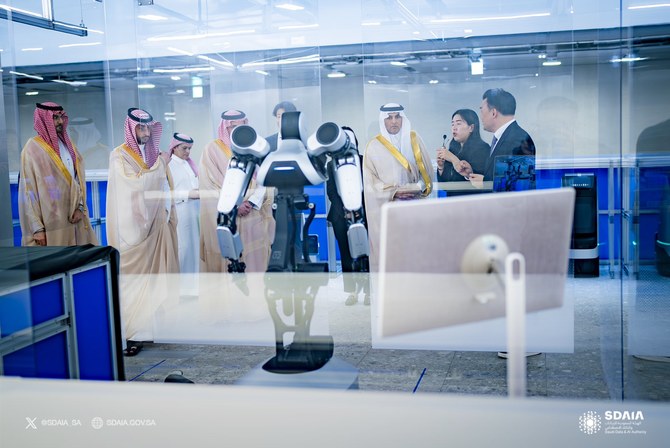
RIYADH: The chief of Saudi Arabia’s artificial intelligence authority took part in a top-level summit on AI held in South Korea from May 21-22.
Co-hosted by South Korea and the UK, the summit focused on international cooperation in data and AI, as well as preparations for the third edition of the Global AI Summit, hosted in Riyadh by the Saudi Data and AI Authority in September.
The authority’s president, Abdullah bin Sharaf Al-Ghamdi, in a roundtable discussion at the Seoul summit, said that AI technologies will “experience significant developments” that will result in more efficient and scalable models capable of handling a wider range of tasks.
He highlighted the significance of open-source AI, which fuels innovation and reshapes the technological landscape. A goal of the summit was to explore the transformative potential of open-source AI and open-access databases, he added.
“Open-source AI has the capability to add flexible character to technology, making advanced tools and algorithms accessible to a broad spectrum of creators, such as large companies and individual developers,” Al-Ghamdi said.
This inclusivity accelerates technological advancement through collaboration and ensures a level of transparency in the digital age, Al-Ghamdi added, calling for robust governance frameworks, international cooperation and continuous public awareness efforts to mitigate risks.
Governments require strategies that balance the need for open-source databases to fuel AI innovations while protecting individual privacy and ensuring data security, a balance that can be achieved through strict data protection laws and technical solutions, the SDAIA chief said.
As data flows transcend national borders, coordinating international standards for data access and privacy becomes critical, he added.
“This requires the presence of globally standardized data protection laws, where local regulations must adapt to address specific cultural and economic contexts. This coordination facilitates smoother data exchange, enhances security and privacy, and helps address global challenges collectively.”
By adopting open-source AI and open databases, “we can bring technology to a larger number of people, promote transparency, and foster a more inclusive technological landscape,” Al-Ghamdi said.
“However, this future also requires effective governance, strong regulatory frameworks, and proactive international collaboration to overcome risks and harness the full potential of AI responsibly.”
The Seoul summit was attended by technology and communications ministers as well as AI experts from countries around the world.



